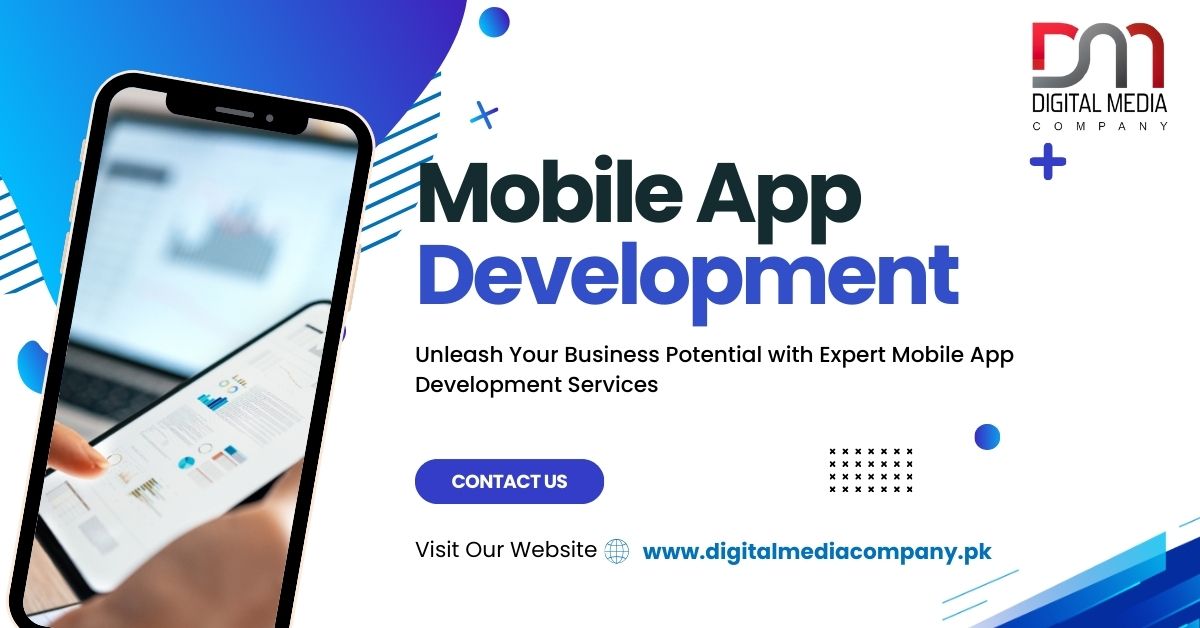Innovate with DMC: Leading Mobile App Development Services
 |
| Mobile App Development |
The demand for mobile apps is surging as more consumers rely on their smartphones and tablets for various tasks, from shopping to banking to social networking. Partnering with a skilled mobile app development team, such as Digital Media Company, allows businesses to leverage the full potential of this growing trend. We explores the intricate world of mobile app development, discussing its benefits, key features, and the development process. It will also highlight the unique value DMC brings to the table and provide insights into choosing the right platform and understanding cost factors. Contacting Digital Media Company (DMC) for your mobile app needs ensures your business stays ahead in this competitive digital age.
Understanding Mobile App Development
Mobile app development is the process of creating software for mobile platforms, such as tablets and smartphones. These applications can be pre-installed on phones during manufacturing, downloaded from an app store, or accessed via a web browser. The development process requires understanding the limitations and advantages of mobile devices and integrating these factors into a cohesive user experience.
Mobile apps are typically built using various programming languages and frameworks depending on the platform (iOS, Android, or cross-platform). Developers must consider device-specific capabilities, screen sizes, and user interactions to deliver a seamless experience. By focusing on user needs and behavior, developers can create engaging and functional apps that drive user engagement and retention. The complexity of mobile app development requires a team of experienced developers, designers, and strategists who can work together to bring an idea to life.
Benefits of Mobile App Development
Mobile app development offers numerous benefits to businesses looking to expand their digital footprint. Firstly, mobile apps provide a direct marketing channel, allowing businesses to reach their customers with personalized offers, notifications, and updates. This direct communication fosters customer loyalty and increases engagement, which is crucial in today’s competitive market.
Secondly, mobile apps enhance customer experience by providing a user-friendly interface and easy access to services and products. Apps can integrate with device features like GPS, camera, and push notifications, offering a more interactive and engaging user experience. Higher conversion rates and increased customer satisfaction can result from this degree of participation. Furthermore, a well-designed mobile app can serve as a powerful tool for gathering customer insights and analytics, enabling businesses to make data-driven decisions.

Key Features of Successful Mobile Apps
The success of a mobile app hinges on its features and functionality. A successful app must be intuitive, easy to navigate, and provide value to the user. Key features of successful mobile apps include user-friendly design, fast loading times, offline functionality, and seamless integration with other platforms and services.
Moreover, security is a paramount feature in mobile app development. With the increasing number of cyber threats, it’s crucial to protect user data and privacy. Implementing robust security measures like data encryption, secure login, and regular updates is essential for building user trust and ensuring long-term app success. Additionally, incorporating feedback mechanisms allows developers to continually improve the app based on user feedback and needs.
The Mobile App Development Process
The mobile app development process is a systematic approach that involves several stages, including planning, design, development, testing, and deployment. The process begins with understanding the client’s requirements and the target audience. This step is crucial as it lays the foundation for the app’s design and functionality.
Following the planning stage, the design phase involves creating wireframes and prototypes to visualize the app’s user interface and user experience. Once the design is approved, the development phase begins, where developers write the code for the app. After development, the app undergoes rigorous testing to identify and fix any bugs or issues. Finally, the app is deployed to app stores for users to download and install. Continuous monitoring and updates are necessary to keep the app functional and up-to-date with the latest trends and technologies.

Choosing the Right Platform for Your Mobile App
Selecting the right platform for your mobile app is a critical decision that can impact its success. The two primary platforms are iOS (Apple) and Android (Google), each with its own set of tools, languages, and user demographics. While iOS apps are developed using Swift or Objective-C, Android apps are built using Java or Kotlin.
When deciding on a platform, businesses must consider their target audience, budget, and desired features. For example, if the target audience predominantly uses iPhones, iOS would be the ideal platform. However, if the goal is to reach a broader audience, developing for both iOS and Android or choosing a cross-platform solution may be more effective. Each platform has its unique advantages, and a professional development team can help guide you through the decision-making process to ensure your app aligns with your business goals.
Importance of User Experience (UX) and User Interface (UI)
User Experience (UX) and User Interface (UI) are crucial components of mobile app development. UX focuses on the overall feel of the app, ensuring it is easy to use, intuitive, and provides value to the user. A positive UX increases user satisfaction and encourages repeat use, which is essential for the app’s success.
UI, on the other hand, deals with the app’s visual elements, such as layout, colors, and fonts. A well-designed UI makes the app aesthetically pleasing and easy to navigate, enhancing the overall user experience. Both UX and UI must work together seamlessly to create a cohesive and engaging app. At Digital Media Company, our team of expert designers ensures that every app we develop is not only functional but also visually appealing, providing an exceptional user experience.

The Role of DMC in Mobile App Development
Digital Media Company (DMC) plays a pivotal role in the mobile app development landscape, offering comprehensive services that cover every aspect of the development process. From initial concept and design to development and deployment, DMC’s team of experts works closely with clients to understand their unique needs and objectives. This collaborative approach ensures that every app is tailored to the client’s specific requirements, providing a customized solution that drives results.
DMC is dedicated to delivering high-quality mobile apps that not only meet but exceed client expectations. With a focus on innovation and user-centric design, DMC helps businesses harness the power of mobile technology to enhance their brand presence and engage their customers. By choosing Digital Media Company for your mobile app development needs, you can be confident that you are partnering with a team that is committed to your success.
Cost Factors in Mobile App Development
The cost of mobile app development can vary significantly depending on several factors, including the complexity of the app, the number of features, and the platforms targeted. Simple apps with basic functionality can be developed at a lower cost, while more complex apps with advanced features like real-time updates, GPS, and integrated payment systems will require a larger budget.
Additionally, the choice of platform (iOS, Android, or cross-platform) can impact the overall cost. Developing an app for both iOS and Android separately can be more expensive than opting for a cross-platform solution. However, cross-platform development may come with its own set of challenges and limitations. It’s important to work with a professional development team Digital Media Company that can provide a detailed cost estimate and guide you through the decision-making process to ensure your software fits your spending plan and professional objectives.
Future Trends in Mobile App Development
The mobile app development landscape is constantly evolving, driven by technological advancements and changing user preferences. Some of the emerging trends in mobile app development include the integration of artificial intelligence (AI) and machine learning (ML), the rise of augmented reality (AR) and virtual reality (VR) applications, and the increasing popularity of wearable technology.
AI and ML are transforming the way apps interact with users, providing personalized experiences and automating tasks. AR and VR are being used to create immersive experiences, particularly in gaming, education, and retail. Wearable technology, such as smartwatches and fitness trackers, is also becoming more integrated with mobile apps, offering new opportunities for user engagement. Staying ahead of these trends requires a forward-thinking approach and a willingness to innovate, which is where DMC excels.

FAQs
What is mobile app development?
Mobile app development refers to the process of creating software for mobile platforms, such as tablets and smartphones. This process includes designing, developing, testing, and deploying applications tailored to meet specific user needs and preferences.
Why should I invest in mobile app development for my business?
Investing in mobile app development allows businesses to reach a wider audience, enhance customer engagement, and improve brand recognition. Mobile apps provide a direct channel for communication with customers, offering personalized experiences and fostering customer loyalty.
How long does it take to develop a mobile app?
The time required to develop a mobile app depends on its complexity, features, and platform. A simple app can take a few months, while a more complex app with advanced features may take six months or longer.
How much does it cost to develop a mobile app?
The cost of developing a mobile app varies based on the app’s complexity, features, and platform. It can range from a few thousand dollars for a simple app to hundreds of thousands for a more complex, feature-rich app. Contacting Digital Media Company will provide you with a detailed cost estimate tailored to your specific needs.
What platforms should I choose for my mobile app?
Choosing the right platform depends on your target audience, budget, and desired features. iOS is ideal for a more affluent audience, while Android has a larger user base. A cross-platform approach can help reach a wider audience, but it may come with additional challenges.
Conclusion
Mobile app development is a critical component of a modern business strategy, offering numerous benefits, including enhanced customer engagement, increased brand recognition, and valuable data insights. By partnering with a professional development team Digital Media Company, businesses can leverage the full potential of mobile technology to drive growth and success. Digital Media Company (DMC) provides comprehensive mobile app development services tailored to meet your specific needs, ensuring a seamless and engaging user experience. Whether you’re looking to develop a new app from scratch or enhance an existing one, contacting DMC is the first step towards achieving your business goals and strengthening your online presence.
Investing in a well-designed mobile app is an investment in your business’s future. By choosing Digital Media Company, you are choosing a partner dedicated to innovation, quality, and customer satisfaction. With our expertise and commitment to excellence, we help businesses of all sizes harness the power of mobile technology to thrive in the digital age. Contact Digital Media Company (DMC) today to learn more about our mobile app development services and how we can help you grow your business and enhance your online presence.
Comments
Post a Comment